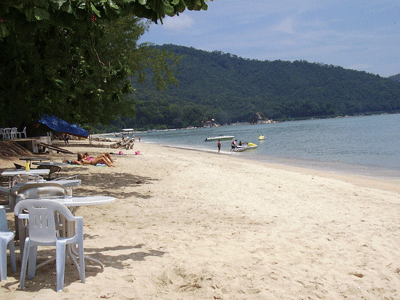 Malaysia’s colonial past as a former stronghold of the British, Dutch and Portuguese provides many interesting heritage and cultural sights in its 13 states, including the quaint city of Malacca, a Unesco World Heritage Site, and contributes to a more international perspective than many of its neighbours in the region.
As a multicultural country of 26 million with sizeable Chinese and Indian populations as well as the majority Malays, Malaysia offers a fascinating and rare case study of multi-ethnic co-existence in action. That makes daily life more interesting too – culture lovers will enjoy a triple serving of religious, historical and architectural treasures provided by the racial mix, and foodies will be spoiled for choice by the selection of culinary delights afforded by three national cuisines.
Overall, primary health care is well developed across the country, according to the World Health Organization. A variety of public and private hospitals and western and eastern medical practices are available, along with a wide range of spa and traditional alternative health services.
Although property prices in the capital, Kuala Lumpur, are not cheap, house and apartment sizes are generally much larger than in the country’s more developed neighbours such as Hongkong and Singapore. Neighbouring Thailand offers lower property prices but less stability at the moment.
The Malaysian government is actively encouraging foreigners to settle in the country through its Malaysia My Second Home programme, also known as MM2H. Applicants need to show they are financially self-sufficient. Those aged 50 or above must also show proof of owning at least MYR350,000 (US$105,500) in liquid assets, plus an off-shore income of MYR10,000 (US$3,014) per month, if they are still working.
Malaysia’s colonial past as a former stronghold of the British, Dutch and Portuguese provides many interesting heritage and cultural sights in its 13 states, including the quaint city of Malacca, a Unesco World Heritage Site, and contributes to a more international perspective than many of its neighbours in the region.
As a multicultural country of 26 million with sizeable Chinese and Indian populations as well as the majority Malays, Malaysia offers a fascinating and rare case study of multi-ethnic co-existence in action. That makes daily life more interesting too – culture lovers will enjoy a triple serving of religious, historical and architectural treasures provided by the racial mix, and foodies will be spoiled for choice by the selection of culinary delights afforded by three national cuisines.
Overall, primary health care is well developed across the country, according to the World Health Organization. A variety of public and private hospitals and western and eastern medical practices are available, along with a wide range of spa and traditional alternative health services.
Although property prices in the capital, Kuala Lumpur, are not cheap, house and apartment sizes are generally much larger than in the country’s more developed neighbours such as Hongkong and Singapore. Neighbouring Thailand offers lower property prices but less stability at the moment.
The Malaysian government is actively encouraging foreigners to settle in the country through its Malaysia My Second Home programme, also known as MM2H. Applicants need to show they are financially self-sufficient. Those aged 50 or above must also show proof of owning at least MYR350,000 (US$105,500) in liquid assets, plus an off-shore income of MYR10,000 (US$3,014) per month, if they are still working.
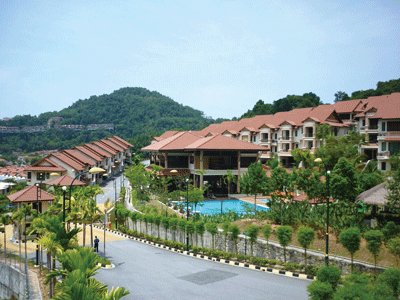 After submitting the relevant forms, the applicant will be able to collect his or her MM2H visa, called a Social Visit Pass, in about three weeks. The pass is issued for a maximum validity of 10 years, which can be renewed.
Approved participants in the MM2H programme and their dependants must be in possession of valid medical insurance coverage that is applicable in Malaysia from any insurance company. However, exemptions may be given to participants who find it difficult to obtain medical insurance because of their age or medical condition.
Since January 2009, applicants can apply directly through the MM2H programme without having to hire an agency to prepare and process the application. Visit www.mm2h.gov.my for full details of the process and to download the application forms.
Agencies licensed by Malaysia’s Ministry of Tourism offer full visa application and related services to foreigners wishing to retire to Malaysia. For a full list of licensed agents, go to www.mm2h.gov.my/licensing.php
Foreign residents who wish to buy a Malaysian residential property pay a minimum purchase price established by state governments.
The minimum price is MYR500,000 (US$150,756) in all states except Sarawak, where the minimum purchase price is YR350,000 (US$105,500).
Properties available run the gamut of detached houses and bungalows, terraced and semi-detached houses, apartments, serviced apartments and condominiums.
Starting your search online is the easiest option. Malaysia’s biggest property portal is Iproperty.com (www.iproperty.com.my), where you can find pictures and details of properties all over the country.
As a first step, would-be residents need to think about how much they want to spend and specify the kind of living environment they prefer, says Jan Yong, editor of Iproperty.com.
“Generally, it depends on the budget of the client, whether he prefers country or city living. Penang is cheaper than KL and offers beaches and a slower pace of life. However, for those who like city life, KL might be better although it has the perennial traffic jam problem,” she says.
After submitting the relevant forms, the applicant will be able to collect his or her MM2H visa, called a Social Visit Pass, in about three weeks. The pass is issued for a maximum validity of 10 years, which can be renewed.
Approved participants in the MM2H programme and their dependants must be in possession of valid medical insurance coverage that is applicable in Malaysia from any insurance company. However, exemptions may be given to participants who find it difficult to obtain medical insurance because of their age or medical condition.
Since January 2009, applicants can apply directly through the MM2H programme without having to hire an agency to prepare and process the application. Visit www.mm2h.gov.my for full details of the process and to download the application forms.
Agencies licensed by Malaysia’s Ministry of Tourism offer full visa application and related services to foreigners wishing to retire to Malaysia. For a full list of licensed agents, go to www.mm2h.gov.my/licensing.php
Foreign residents who wish to buy a Malaysian residential property pay a minimum purchase price established by state governments.
The minimum price is MYR500,000 (US$150,756) in all states except Sarawak, where the minimum purchase price is YR350,000 (US$105,500).
Properties available run the gamut of detached houses and bungalows, terraced and semi-detached houses, apartments, serviced apartments and condominiums.
Starting your search online is the easiest option. Malaysia’s biggest property portal is Iproperty.com (www.iproperty.com.my), where you can find pictures and details of properties all over the country.
As a first step, would-be residents need to think about how much they want to spend and specify the kind of living environment they prefer, says Jan Yong, editor of Iproperty.com.
“Generally, it depends on the budget of the client, whether he prefers country or city living. Penang is cheaper than KL and offers beaches and a slower pace of life. However, for those who like city life, KL might be better although it has the perennial traffic jam problem,” she says.
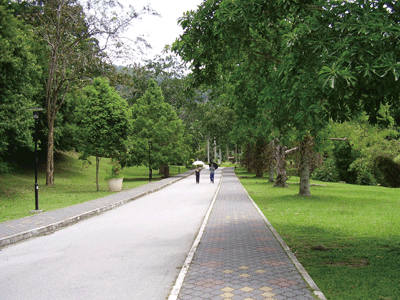 As the impact of the financial crisis begins to retreat, prices are reasonable, she adds.
“Most analysts agree that our economy is picking up and now is the right time to buy,” she says.
For spacious suburban living at the top end of the market, a 441sqm five bedroom, four bathroom semi-detached house complete with private swimming pool in a new, gated development with clubhouse and gym in Mont Kiara, a 15-minute drive north of Kuala Lumpur, costs around MYR3.4 million, equivalent to just over US$1million.
Smaller properties cost substantially less. A new 78sqm, two-bedroom, two-bathroom condominium with car park in the commercial centre of KL is currently offered on Iproperty’s website for MYR328,000 (US$99,000).
Cooler temperatures and clean, fragrant air are found in the highland areas near the centre of Malaysia, such as Fraser’s Hill in the state of Pahang. Here, a 95sqm fully-furnished apartment overlooking a golf course in Silverpark costs MYR135,000 (US$41,000)
One way to get a closer overview of the housing options and find out more about a particular area is to use the services of a one-stop agency with strong local knowledge.
One such company is Alter Domus, (www.penangmyhome.com), a relocation agency based in Penang that offers a full visa application service, help with property purchase, renovation and caretaking and advice on practical issues including opening a bank account and cultural norms.
The company claims it has close to 80 percent of the market share for relocations to Penang and a 99.5 percent success rate in getting visas approved for its clients.
The majority of Alter Domus’ clients are from Europe, Australia and New Zealand. Most are professionals who have lived in Asia for many years and who want to retire to a relaxed, unpolluted and cost-effective place where the weather is good and English is widely spoken, says Roselind Moey, the agency’s marketing director.
Successful adaptation to life as a retiree in Malaysia depends largely on whether newcomers have experience of living in the region. “If they had working experience in Asia before, then this is probably a very good place. But if they are coming directly from their own country, then it’s probably the weather and the culture [that are most difficult to adapt to],” says Moey.
The natural attractions of Penang, a land-accessible island situated off the country’s western coast, are easy to appreciate.
The place offers miles of unpolluted coastlines, green surroundings and a living environment that blends colonial architecture with relaxed tropical living. “Penang is very different from the rest of the country. It has the conveniences of the modern city but still retains its small-town charm,” says Moey.
Property here costs more than in most of the rest of the country because land is limited and development is restricted in order to ensure plenty of open green areas. Nonetheless, she says most people from developed countries find the prices reasonable compared to those in their home countries.
Medical services in Penang provide value for money and the standard is good, with many of Penang’s doctors trained in the UK, says Moey. Specialist consultations cost around US$22. “Many Malaysians find the cost of healthcare reasonable,” she says.
As the impact of the financial crisis begins to retreat, prices are reasonable, she adds.
“Most analysts agree that our economy is picking up and now is the right time to buy,” she says.
For spacious suburban living at the top end of the market, a 441sqm five bedroom, four bathroom semi-detached house complete with private swimming pool in a new, gated development with clubhouse and gym in Mont Kiara, a 15-minute drive north of Kuala Lumpur, costs around MYR3.4 million, equivalent to just over US$1million.
Smaller properties cost substantially less. A new 78sqm, two-bedroom, two-bathroom condominium with car park in the commercial centre of KL is currently offered on Iproperty’s website for MYR328,000 (US$99,000).
Cooler temperatures and clean, fragrant air are found in the highland areas near the centre of Malaysia, such as Fraser’s Hill in the state of Pahang. Here, a 95sqm fully-furnished apartment overlooking a golf course in Silverpark costs MYR135,000 (US$41,000)
One way to get a closer overview of the housing options and find out more about a particular area is to use the services of a one-stop agency with strong local knowledge.
One such company is Alter Domus, (www.penangmyhome.com), a relocation agency based in Penang that offers a full visa application service, help with property purchase, renovation and caretaking and advice on practical issues including opening a bank account and cultural norms.
The company claims it has close to 80 percent of the market share for relocations to Penang and a 99.5 percent success rate in getting visas approved for its clients.
The majority of Alter Domus’ clients are from Europe, Australia and New Zealand. Most are professionals who have lived in Asia for many years and who want to retire to a relaxed, unpolluted and cost-effective place where the weather is good and English is widely spoken, says Roselind Moey, the agency’s marketing director.
Successful adaptation to life as a retiree in Malaysia depends largely on whether newcomers have experience of living in the region. “If they had working experience in Asia before, then this is probably a very good place. But if they are coming directly from their own country, then it’s probably the weather and the culture [that are most difficult to adapt to],” says Moey.
The natural attractions of Penang, a land-accessible island situated off the country’s western coast, are easy to appreciate.
The place offers miles of unpolluted coastlines, green surroundings and a living environment that blends colonial architecture with relaxed tropical living. “Penang is very different from the rest of the country. It has the conveniences of the modern city but still retains its small-town charm,” says Moey.
Property here costs more than in most of the rest of the country because land is limited and development is restricted in order to ensure plenty of open green areas. Nonetheless, she says most people from developed countries find the prices reasonable compared to those in their home countries.
Medical services in Penang provide value for money and the standard is good, with many of Penang’s doctors trained in the UK, says Moey. Specialist consultations cost around US$22. “Many Malaysians find the cost of healthcare reasonable,” she says.
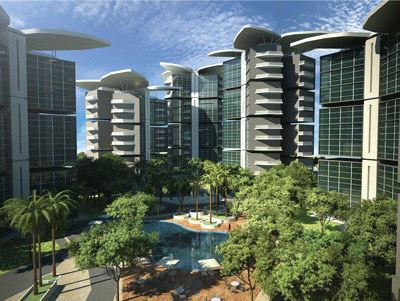 Another option is to move to a purpose-built village where everything has been designed to meet the needs of residents from overseas and retirees. LakeHill Resort is a large new development located in Iskander, a special economic zone in the south of the country, 70 minutes’ drive from Singapore’s Changi International Airport. The resort is built on 484 acres around a natural lake complete with gondolas and surrounded by open air dining opportunities. It offers a total of 11,517 residential units, including a selection of retirement condominiums and houses that is tailored to the needs of active retirees. Sales of these properties start in August this year.
The era of having to choose between a hospital-like environment and a home for the aged is gone, says Dato’ Bill Ch’ng, president and CEO of Malaysia Pacific Corporation Berhad which is behind the development.
“I wish to create for the retirees a new outlook in retirement. The goal is [to kindle in them] a wish to live happily despite [being] in retirement, coupled with a new sense of purpose to live longer,” he says.
Retirees are often attracted by the lower cost of living in Malaysia relative to their country of origin, which makes enjoying the good things in life easier. “The cost of doing business, property prices, living and retirement expenses are very much lower and more affordable than in Singapore, Hong Kong, London, Tokyo, Seoul, Shanghai, Sydney, etc,” says Ch’ng.
Another option is to move to a purpose-built village where everything has been designed to meet the needs of residents from overseas and retirees. LakeHill Resort is a large new development located in Iskander, a special economic zone in the south of the country, 70 minutes’ drive from Singapore’s Changi International Airport. The resort is built on 484 acres around a natural lake complete with gondolas and surrounded by open air dining opportunities. It offers a total of 11,517 residential units, including a selection of retirement condominiums and houses that is tailored to the needs of active retirees. Sales of these properties start in August this year.
The era of having to choose between a hospital-like environment and a home for the aged is gone, says Dato’ Bill Ch’ng, president and CEO of Malaysia Pacific Corporation Berhad which is behind the development.
“I wish to create for the retirees a new outlook in retirement. The goal is [to kindle in them] a wish to live happily despite [being] in retirement, coupled with a new sense of purpose to live longer,” he says.
Retirees are often attracted by the lower cost of living in Malaysia relative to their country of origin, which makes enjoying the good things in life easier. “The cost of doing business, property prices, living and retirement expenses are very much lower and more affordable than in Singapore, Hong Kong, London, Tokyo, Seoul, Shanghai, Sydney, etc,” says Ch’ng.
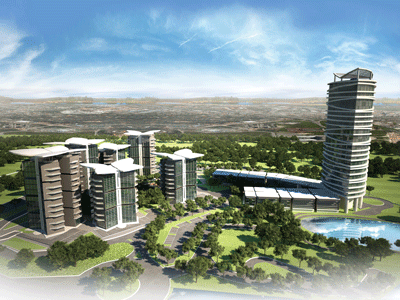 LakeHill and the surrounding areas benefit from a climate that is sunny all year round, with temperatures ranging from 30 to 35 degrees Celsius. Within the vicinity are international class golf courses and there are green spaces and recreation and wellness facilities both inside and outside the resort. White sandy beaches are a 30-minute drive away. International supermarkets are a short drive away and the area is well served by highways and public transport.
The resort will also include a specialist hospital and two general hospitals are located nearby in case of emergency. “The ambience for retirement is perfect,” says Ch’ng. The resort is part of Asia Pacific Trade and Expo City (APTEC), dubbed a city within a city, which aims to be Asia’s largest permanent trade expo and a one-stop hub for the distribution of consumer products. The city will have a resort feel where residents can find leisure, work and recreational activities.
“The city plan is eco-friendly, ageing-friendly, [in a] securitised gated community, where healthcare, wellness, recreation and spas are all situated within walking distance from each other in the vicinity,” says Ch’ng.
Here, “active retirement” is more than just a buzzword. Foreign residents over the age of 50 may be granted work permits entitling them to work part-time if their skills are required.
At LakeHill, retirees who are looking for new challenges on their doorstep can choose to pass on their store of knowledge by becoming part-time lecturers at APTEC University and Vocational College or by working as part-time consultants or mangers of small businesses set up by APTEC.
LakeHill and the surrounding areas benefit from a climate that is sunny all year round, with temperatures ranging from 30 to 35 degrees Celsius. Within the vicinity are international class golf courses and there are green spaces and recreation and wellness facilities both inside and outside the resort. White sandy beaches are a 30-minute drive away. International supermarkets are a short drive away and the area is well served by highways and public transport.
The resort will also include a specialist hospital and two general hospitals are located nearby in case of emergency. “The ambience for retirement is perfect,” says Ch’ng. The resort is part of Asia Pacific Trade and Expo City (APTEC), dubbed a city within a city, which aims to be Asia’s largest permanent trade expo and a one-stop hub for the distribution of consumer products. The city will have a resort feel where residents can find leisure, work and recreational activities.
“The city plan is eco-friendly, ageing-friendly, [in a] securitised gated community, where healthcare, wellness, recreation and spas are all situated within walking distance from each other in the vicinity,” says Ch’ng.
Here, “active retirement” is more than just a buzzword. Foreign residents over the age of 50 may be granted work permits entitling them to work part-time if their skills are required.
At LakeHill, retirees who are looking for new challenges on their doorstep can choose to pass on their store of knowledge by becoming part-time lecturers at APTEC University and Vocational College or by working as part-time consultants or mangers of small businesses set up by APTEC.
WHERE TO STAY
After 15 years of living in Malaysia, strategy consultant Ron Anderson knows exactly where he and his homemaker wife will retire – right where they are: Malaysia.
The couple, who are in their 60s, have completed all the procedures required by the MM2H programme, and will finalise their application as soon as Anderson’s current work visa expires. Even after that, he will continue to work as a consultant, at least on a part-time basis.
“MM2H allows for 20 hours a week,” says the soft-spoken Irishman. The possibility of continuing his work was a major factor in the couple’s decision to choose Malaysia as the base for their retirement, he explains.
“A lot of retirees, especially younger retirees, would like to continue to work [in some capacity]. The legislation was only passed last year. Until that, I couldn’t consider it.”
With their most important requirement met, there were still many other considerations that the Andersons took into account.
The couple have travelled extensively throughout Asia and based their decision on the wealth of advantages that Malaysia offers over its neighbours.
They thought about the country’s safety, its stability, the fact that English is widely spoken, the low cost and high standard of living, property costs, social life and food. Malaysia ticked all their boxes.
“Malaysia is very well located and there are no severe weather conditions, especially in Kuala Lumpur,” says Anderson.
The couple, who have invested in condominiums, have found property prices “excellent” value” and the quality of construction very good.
“Ownership of property is easy and there are no conditions except in the value of property you can buy,” says Anderson.
“Property is about half the price of Singapore property, for example, and probably about 10 percent less than an equivalent property in Bangkok.”
Bureaucracy was not an issue either – the Andersons say the MM2H was very straightforward.
To save themselves the hassle of form-filling, they opted to use an agency – Beyond Corporate, whom they found to be very competent.
“It’s so much easier because they do all the paperwork.”
The couple will continue to live in Kuala Lumpur, their current place of residence, because it offers all the facilities they want, including excellent medical facilities.
Although their roots are far away, the Andersons are not concerned about the distance that separates them from some of their family members.
“The world is quite a small place now, and the [transport] infrastructure in Malaysia is excellent. There are a lot of airlines flying in here,” Anderson says.
After pondering his long experience in the country, he can’t think of a single downside to their decision to stay on.
“Air quality? In the main, it’s good. Sometimes the haze comes across from the burning of forests in Indonesia, but we haven’t had that for the past couple of years.”
Liana Cafolla
TIP OFF – Smart Traveller Intelligence
Retiring to a foreign country is a big step. But Malaysia’s user-friendly application process and clear investment regulations make it all that much easier








